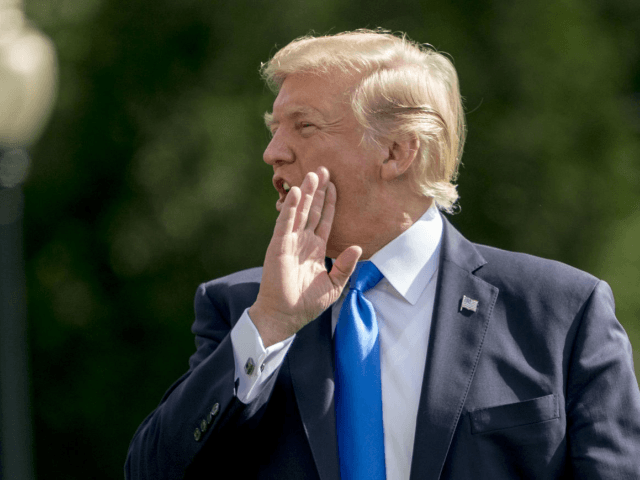In anticipation of his upcoming trip to China, the state-run Global Times praised U.S. President Donald Trump in a column on Wednesday arguing that, in the eyes of the communist regime, Trump had gone “from green to skilled” during his first year in office.
Trump will leave for an extensive trip to east Asia in early November and is expected to meet with Chinese President Xi Jinping while in Beijing. The two had previously met during Xi’s trip to America in April, in which the head of state stayed as a guest of Trump’s at his Mar-a-Lago Florida estate.
The Global Times highlighted areas of cooperation between China and the United States in its column and praised President Trump, suggesting that his alleged instincts to cooperate with the Chinese communist regime were laudable but subject to co-opting by unspecified nefarious influences in the White House.
“Since Trump took office 10 months ago, he has transformed from green to skilled in comprehending China and dealing with Sino-US relations, and has basically formed constructive conceptions of China,” the article claims. “The two leaders [Xi and Trump] have maintained active communication quite similar to the former.”
The article applauds Trump and Xi for having “established the framework for comprehension and solutions for the relationship, guiding departments to hold the right direction, expand common views, control divergences and strengthen cooperation in their specific work.”
It warns, however, that American diplomacy is “unstable” because of the free nature of its political institutions. Unlike Xi, Trump does not enjoy an ironclad grip over every single aspect of running the United States, which leads to “uncertainty in [America’s] diplomacy with China.”
The piece argues that Trump is “is in a politically weak position, suffering disruption involving the media, Congress and vested interest groups.” Unlike Trump, Xi does not have to contend with a free media or any opposition in his own government. This is especially true following the culmination of the 19th Communist Party Congress this week, in which Xi’s name was enshrined in the party’s constitution alongside Mao Zedong and Deng Xiaoping.
America’s free society “makes Chinese worry about whether the US can maintain a consistent policy when cooperating with China,” the Global Times argues. “Although Trump holds an optimistic and constructive stance, his China policy will vacillate depending on domestic factors,” it adds.
China Daily, a separate state-run media entity, also praised Trump’s diplomacy with China while warning that “inherent uncertainties, suspicions and competition between the US and China” stand in the way of a beneficial relationship with America for China. The China Daily piece warns of the “Thucydides trap,” which Chinese media is increasingly obsessed by—the notion that China and America are destined for war because this is the fate of the relationship between all established powers and their developing adversaries.
Instead of this prediction, China Daily offers a “win-win” approach, using a Chinese catchphrase typically reserved for urging the rest of the world to allow its various transgressions in the South China Sea, accept its claims of sovereignty over Taiwan, and never question its economic moves in Africa, Southeast Asia, and Latin America.
Reports suggest that at least one issue, the latter, will come up when President Trump is in Beijing next month. India’s Hindustan Times reports that a senior White House official confirmed on Monday that Trump will challenge China to “cease predatory trade” in developing nations.
“Trump will underscore his commitment to long-standing U.S. alliances and partnerships and reaffirm leadership on promoting a free and open Indo-Pacific,” the official reported stated. “China must provide fair and reciprocal treatment to U.S. firms and cease predatory trade and investment practices.”
Secretary of State Rex Tillerson hinted at a pivot to addressing these issues last week, protesting during a speech that China using financing options for developing nations “which result in saddling them with enormous levels of debt.”
“They don’t often create the jobs, which infrastructure projects should be tremendous job creators in these economies, but too often foreign workers are brought in to execute these infrastructure projects,” he continued. “Financing is structured in a way that makes it very difficult for them to obtain future financing, and often has very subtle triggers in the financing that results in financing default, and the conversion of debt into equity.”

COMMENTS
Please let us know if you're having issues with commenting.